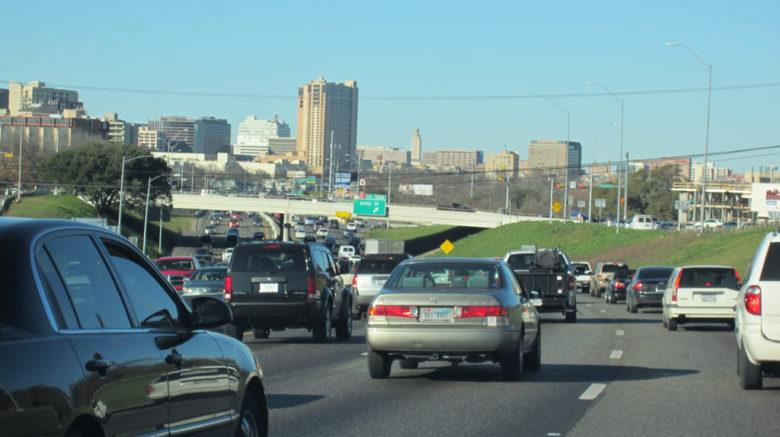The Capital Area Metropolitan Planning Organization (CAMPO) Transportation Policy Board (TPB) will meet on June 8th to make a decision regarding which previously approved projects will have their funding maintained or deferred as part of the 2021-2024 Transportation Improvement Program (TIP). This decision is necessary after the Texas Department of Transportation (TxDOT) requested a $633 million funding reprioritization to support the I-35 Capital Express Project.
Since only a limited amount of funds are available, projects selected to have their funding maintained should be those that best ensure the safety and well-being of residents and align with CAMPO’s goals of: Safety, Mobility, Stewardship, Economy, Equity, and Innovation as outlined in the draft 2045 Regional Transportation Plan (RTP). The RTP represents the long-term goals for development in the CAMPO region, and each TIP document representing short-term goals should contribute to those long-term priorities.
Comments are due today, June 1, to comments@campotexas.org. Please take five minutes to put your opposition to the wasteful project of adding feeder lanes to the 183A toll road on the record.
However, some projects would satisfy those ends more effectively than others, especially when COVID-19 is raising questions about the future. Proposed active transportation projects would improve pedestrian and cycling safety, while others like the addition of Emergency/Transit Vehicle Signal Priority systems represent important technological innovations. These projects could improve quality of life for residents in the region.
Other projects like the proposed addition of frontage roads to portions of highway 183A (0151-10-001) run counter to many of these goals. This proposed project is expected to cost $75 million, which represents 48 percent of the roughly $155.9 million available to maintain currently funded projects. Directing those funds to other projects could potentially fund a variety of other projects to provide a more equitable distribution of funds across the CAMPO region, but would also provide safer, more sustainable, and more innovative transportation solutions.
In 2002, TxDOT released materials expanding on their policy to avoid building frontage roads along freeways whenever possible since they commonly cause safety problems when slower-moving vehicles merge, reduce travel speeds on the freeway, and cause freeways to reach capacity much sooner as businesses along frontage roads increase local traffic.
While frontage roads are often considered a necessary method to increase economic development in a region, TxDOT also notes that, “other states have proven, economic development occurs without frontage roads. When planned properly, development occurs without local traffic depending on freeways as a primary source of access. This planning improves safety on the freeway while allowing a wider corridor for economic development…Freeways without frontage roads will decrease congestion and support economic development well into the future.”
The proposed 183A frontage road project is also projected to begin in August of 2023, later than many other roadway projects that are slated to be deferred. The project’s application mentioned that additional right of way would need to be acquired before the project could begin. Spending our transportation funds to maximize jobs is even more important now.
Since this proposed project would represent 48 percent of the available funds to maintain previously approved projects without clearly benefiting 48 percent of the residents within the region, it raises clear equity concerns. Those funds could provide more benefit if allocated to a variety of other projects that would be ready to begin sooner.
TxDOT acknowledged more than fifteen years ago that frontage roads cause safety and congestion problems and other states have shown they are not necessary for economic growth, construction of additional frontage roads is not consistent with CAMPO’s long-term goals of safety, mobility, or innovation. Additionally, it would be contributing to a history of development that encourages sprawl and motor vehicle traffic, making it a sustainability concern as well.
This project does not support CAMPO’s long-term goals for the region and therefore should not be a priority during a time of limited resources. Other projects would provide greater benefits to the region.
CAMPO is accepting public comments on the proposed project deferments until Monday, June 1 at comments@campotexas.org. The Policy Board will meet again on Monday, June 8 at 2 p.m. to make a final decision about which projects to defer, when members of the public will have an opportunity to call in and make public comments. CAMPO hosts live streams on their website and their facebook page.
We strongly encourage you to send in your your wants, desires, vision, and needs for the regional transportation system by emailing CAMPO at comments@campotexas.org today, and asking your friends, family, and colleagues to do the same, by the end of the day Monday, June 1.
Follow Farm&City on Twitter and Facebook for more information about how these projects might affect the CAMPO service area.
You can support our work to empower all Texans to meaningfully engage in equitable, sustainable regional planning by donating to our summer fundraising campaign, which is partially funding our team of summer interns, who are working hard right now to provide context and analysis to aid in this decision on which project to defer.
